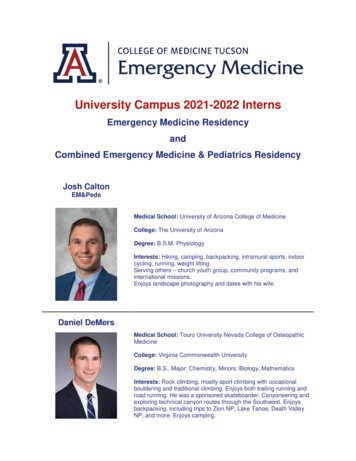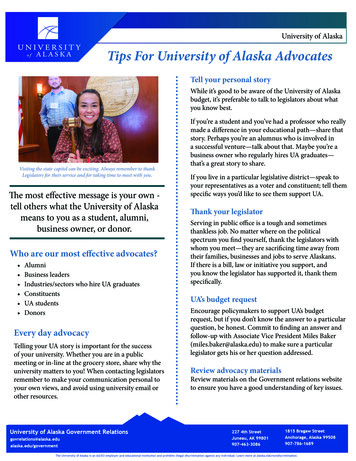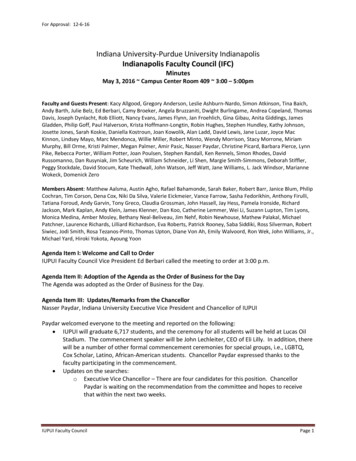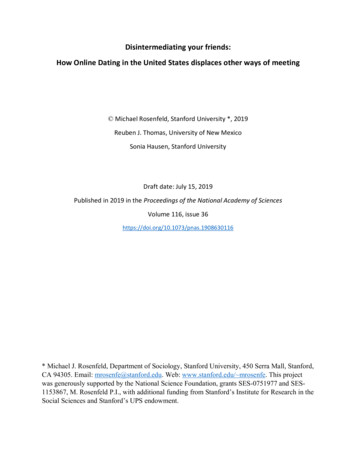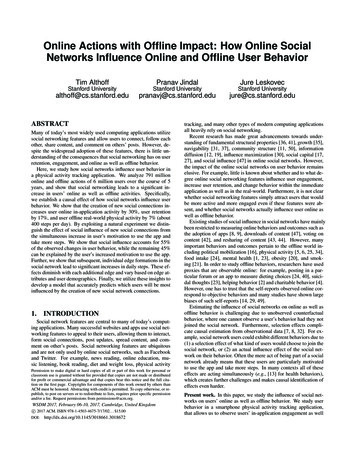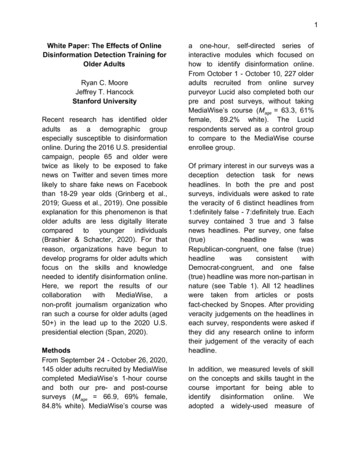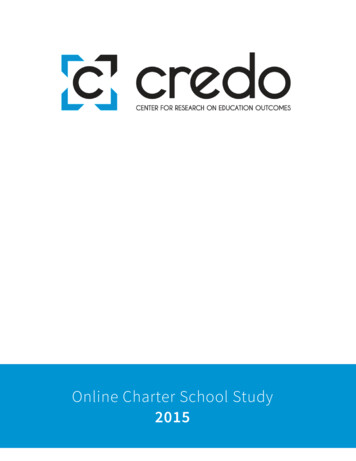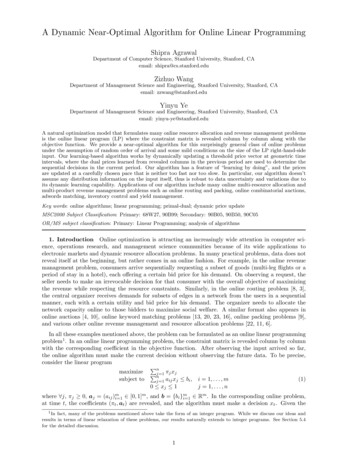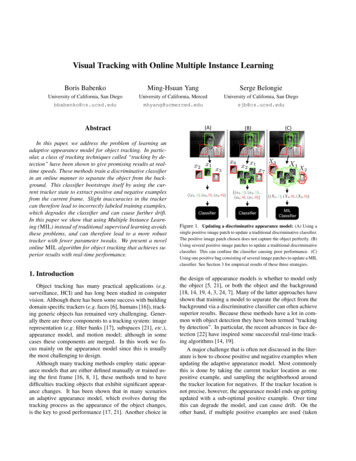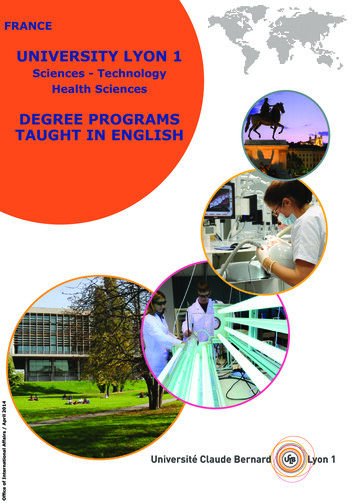
Transcription
FRANCEUNIVERSITY LYON 1Sciences - TechnologyHealth SciencesOffice of International Affairs / April 2014DEGREE PROGRAMSTAUGHT IN ENGLISH
WELCOME TO LYON 1!3WELCOME TO LYON 1!BACHELOR’S DEGREE4The Claude Bernard University Lyon 1 is a multidisciplinary institution that is involved in basic researchBACHELOR’S PROGRAMS IN GEOSCIENCES4and its applications.Lyon 1 offers more than 300 degree-granting programs in Health, Sciences,Technology.MASTER’S DEGREE IN LIFE SCIENCES5Almost 80% of students are enrolled on courses leading to professional qualifications.MASTER’S PROGRAM IN GENETICS, CELL BIOLOGY, PATHOLOGIES5It currently has 69 research laboratories whose work focuses in particular on the areas of Health,MASTER’S PROGRAM IN BIOSCIENCES6Environment and Material Sciences.MASTER’S PROGRAM IN NEUROSCIENCES RESEARCH 2nd Year8MASTER’S DEGREE IN CHEMISTRY9MASTER’S PROGRAM IN SYNTHESIS, CATALYSIS AND SUSTAINABLE CHEMISTRY9MASTER’S DEGREE IN ENGINEERING11MASTER’S PROGRAM IN MECHANICAL ENGINEERING 1st Year11MASTER’S PROGRAM IN MECHANICAL ENGINEERING 2nd YearKEY FIGURES OF LYON 1 40 000 students 10,5 % of foreign students of 134 nationalities 4700 employees A budget of 388,5 million euros11 69 research units More than 4 500 international publications per yearMASTER’S DEGREE IN EARTH SCIENCES12 40 patent applications per yearMASTER’S PROGRAM IN EARTH SCIENCES 1st Year12MASTER’S PROGRAM IN EARTH SCIENCES 2nd Year12MASTER’S DEGREE IN NANOSCALE ENGINEERING13MASTER’S DEGREE PROGRAM IN NANOSCALE ENGINEERING 1st Year16MASTER’S DEGREE PROGRAM IN NANOSCALE ENGINEERING 2nd Year16Lyon 1Campus Map:MASTER’S DEGREE IN DRUG SCIENCES1812 geographical sitesMASTER’S PROGRAM IN SKIN DELIVERY 2nd Year18UNIVERSITY DEGREE & TECHNICAL UNIVERSITY DIPLOMA19MARKETING & MANAGEMENT IN AN INTERNATIONAL CONTEXT19TECHNICAL UNIVERSITY DIPLOMA IN COMPUTER SCIENCES21ENGINEERING22MECHANICAL ENGINEERING22DYNAMIC STUDENT LIFE24INTERNATIONAL OUTREACH24DISCOVER FRANCE WHILE EARNING COLLEGE CREDITS25PhD (3 years, 180 ECTS)Degrees and Diplomasin the French SystemMASTER OF SCIENCE (2 years, 120 ECTS)Master 2nd yearMaster 1st yearBACHELOR (3 years, 180 ECTS)Bachelor 3rd yearProfessionaldegreeDU*Bachelor 2nd yearDUT*In partnership with:Bachelor 1st yearSupported by:2DU*BACCALAUREAT (High-school diploma)* DUT: TECHNICAL UNIVERSITY DIPLOMA* DU: UNIVERSITY DEGREE3
MASTER’S DEGREES IN LIFE SCIENCESBACHELOR’S DEGREEBACHELOR’S DEGREEMASTER’S DEGREES IN LIFE SCIENCESBACHELOR’S PROGRAM IN GEOSCIENCESMASTER’S PROGRAM IN GENETICS, CELL BIOLOGY,PATHOLOGIES Program coordinator : Prof. Fabrice Cordey fabrice.cordey@univ-lyon1.fr Program coordinator: Prof. Marc LEMAIRE marc.lemaire.bio@univ-lyon1.fr Administrative coordinator: Ms Carmen MENA carmen.mena@univ-lyon1.fr Teaching Unit : Geosciences in English IDescription : This course is part of «UE Transversale TR3». It is anintroductory course about Earth Sciences (historical and physical geology),equivalent to EASC 101/102 of North American or Canadian universities.Key words : Introductory Earth sciences, physical geology, historicalgeology2 ECTS20 hoursSeptember - December Teaching Unit : Geosciences in English IIDescription : This course is part of «UE Transversale TR3». It is thesecond part of the introductory course on Earth Sciences, with focus onthe Environment.Key words : Introductory Earth sciences, Environmental issues3 ECTS30 hoursJanuary - June Teaching Unit : Genome to functionDescription : The main goals of these courses are to stimulate exchangesand thinking among students interested by the latest breakthroughs ingenetics and functional genomics and to bring them to formulate researchquestions and projects. Based on scientific conferences held by scientistsfrom research centers around Lyon, the topics can cover several themes:From genotype to phenotype; the small non coding RNA world; epigeneticinheritance.Key words : genetics and functional genomics, epigenetic inheritance,genotype to phenotype Teaching Unit : Immunology and CancerDescription : This UE is based on the basic immunology knowledge ofstudents to develop basic concepts research in immunology that haveapplications in clinical and pharmaceutical research in the field of oncology.The themes will be: the anti-tumor immune response, the cancers of theimmune system, protection of immunosuppressed patients.Key words : anti-tumoral cancer response, immune system cancers Teaching Unit : Cellular aging and cell deathDescription : The goal of this UE is to provide an overview and recentadvances on cell death and cellular aging fields. During this teachingprogram the emphasis will be put on how both fields are critical tounderstand the aging process. The following topics will be addressed:Biology of cell death; Cellular senescence; Cellular aging and damage tothe molecules; Cellular aging and metabolism; Physiopathology of aging.Key words : Cell death, cell aging, protein aggregation, neurodegenerativediseases Teaching Unit : Molecular mechanisms of cell signalingDescription : The goal of this UE is to give a detailed overview on thebiological role and on the molecular mechanisms of signal transductionfrom prokaryotes to high eukaryotes cells. The main aspects of cellsignaling will be covered: The machinery of cell signaling: from signalsto targets; Regulatory functions of cell signaling; Cell signaling throughevolution; Cell signaling and diseases.Key words : signal transduction pathway, cell signaling Teaching Unit : OncologyDescription : The goal of this UE is to complement the UE» tumor cellin its environment» of the 1rst year of the Master, as well as to providean interest in recent and innovative cancer research. The following topicswill be addressed: epidemiology of cancer; metabolic deregulation duringtumogenesis, global approaches in cancer research, news anti-cancertherapies and cancer markers.Key words : Cancer biology, epidemiology of cancer, global approaches(omics) in cancer research Teaching Unit : Scientific EnglishDescription : This unit is designed to prepare Master’s degree studentsfor their future as part of the international scientific community. Thegoal is to teach them to make clear and concise oral communications inEnglish. The program has been designed to give students the confidenceto present their work to an English speaking scientific audience, either inan international congress, a seminar or an interview.Key words : Oral communication, comprehension tests, bibliographicreport43 ECTSCourses: 15 hoursTutorials: 15 hoursJanuary - June3 ECTSCourses: 30 hoursJanuary - June3 ECTSCourses: 15 hoursTutorials: 15 hoursJanuary - June3 ECTSCourses: 20 hoursTutorials: 10 hoursJanuary - June3 ECTSCourses: 20 hoursTutorials: 10 hoursJanuary - June3 ECTSTutorials: 30 hoursSeptember - December5
MASTER’S DEGREES IN LIFE SCIENCESMASTER’S DEGREES IN LIFE SCIENCESMASTER’S PROGRAM IN BIOSCIENCES Teaching Unit : Biological resources and biodiversityDescription : Organized in the form of a conference with introductorylectures and research talks by international leading scientists in the field.A course across disciplinary boundaries: ecology, evolution, economy, legalsciences and natural resources security. This course provides a state-ofthe-art knowledge on the conceptual and methodological advances in thefield of bio-resources, at molecular, organismic, population and ecosystemlevels. Topics covered include: conservation strategies, agriculture anddomestication, breeding in the context of new planetary needs, sustainablemanagement, biocapacity, ecosystem services.Key words : ecology, evolution, economy, conservation, sustainablemanagement, ecosystem services Program coordinator : Dr. Dominique BAAS dominique.baas@univ-lyon1.fr Administrative coordinator: Ms Carmen MENA carmen.mena@univ-lyon1.fr Teaching Unit : Virus and immunityDescription : Organized in the form of a conference with introductorylectures and research talks by international leading scientists in the field.The course provides the means to understand the latest discoveries invirology and immunology. Topics covered include: biochemistry andstructural biology of viruses, genetic variability, anti-viral treatments andresistance; the interaction between viruses and the immune system; thegeneration of immune memory, the modulation of immune response,immunosuppression, and viral persistence; viral pathogenesis anti-viralvaccination; viral vectors for gene therapy.Key words : virology, immune system, infectiology, structural biology,vaccination, gene therapy Teaching Unit : Comparative genomicsDescription : Organised in the form of a conference with introductorylectures and research talks by international leading scientists in the field.The course introduces comparative genomics and how it enables a globalapproach to the mechanisms involved in the diversity of genomes, ofphenotypes, or of populations. Topics covered include: transposableelements and gene appearance, gene and genome duplication, sexualchromosomes, phylogenomics, phylogeny and evolution of bacteria,evolutionary genomics of human origin, evolutionary dynamics of noncoding DNA, genomics of speciation, genome architecture.Key words : evolution, phylogeny, genome dynamics, population genomics Teaching Unit : Integrative Cell Biology and ImmunologyDescription : Organized in the form of a conference with introductorylectures and research talks by international leading scientists in the field.The course provides an integrated and multidisciplinary understanding ofhow multicellular systems maintain their homeostasis, with a focus on theimmune system function in health and disease. Topics covered include:homeostatic roles of cell survival, cell migration, communication, orsensing the environment; animal models of immune disease, autoimmunediseases, immunodeficiency, hypersensitivity, tumour immunology,genetics and development of the immune system.Key words : cell biology, immune system, homeostasis, pathology,development Teaching Unit : Tissue engineeringDescription : Organised in the form of a conference with introductorylectures and research talks by international leading scientists in the field.Following a general survey of the extra-cellular matrix, the course coverstissular engineering at both fundamental and medical levels. Specific topicsinclude: three-dimensional matrices, biomaterials, stem cells; skin, bone,cartilage, and neural tissues; applications in grafting, transplantation,or regeneration; ethical issues. A practical introduction to applications isprovided by visits to biotechnological companies based in Lyon.Key words : biotechnology, bioengineering, extra-cellular matrix, stemcells, grafting Teaching Unit : Mechanisms of development in plants and animalsDescription : Organized in the form of a conference with introductorylectures and research talks by international leading scientists in the field.This course explores the mechanisms of development conceptuallyrenewed thanks to new methods of cell biology, imaging, moleculargenetics, modelling, and model organisms. Topics covered include:fertilization, embryogenesis and axis determination; cellular dynamics andmorphogenesis; regulation of developmental genes; biophysical regulation;modelling; stem cells and cell-fate; sex determination; epigenetics anddevelopmental plasticity; evolution and development.Key words : embryogenesis, differentiation, morphogenesis, biophysicsand modelling, developmental plasticity, evo-devo66 ECTS2 weeks in JuneCourses: 40 hoursTutorials: 20 hours6 ECTS2 weeks in FebruaryCourses: 40 hoursTutorials: 20 hours6 ECTS2 weeks in JanuaryCourses: 40 hoursTutorials: 20 hours6 ECTS2 weeks in FebruaryCourses: 40 hoursTutorials: 20 hours6 ECTS2 weeks in June6 ECTS2 weeks in JanuaryCourses: 40 hoursTutorials: 20 hoursCourses: 40 hoursTutorials: 20 hours6 ECTS2 weeks in June Teaching Unit : Central & Peripheral Control of Glucose & EnergyDescription : Organized in the form of a conference with introductorylectures and research talks by international leading scientists in the field.The objectives of this course are to describe at molecular, cellular andintegrated levels how signals originating from the periphery of the bodyconverge to and are integrated by the central nervous system in orderto maintain energy homeostasis. Topics covered include: coordination ofgut, endocrine pancreas, adipose tissue and nervous system; hormonal,nervous, and nutrient-based signals; neurotransmitters and neuronalplasticity; pathologies such as obesity and diabetes.Key words : homeostasis, physiology, hormones, nutrients, neuralsystem, pathologyCourses: 40 hoursTutorials: 20 hours Teaching Unit : Neural basis of cognition: from genes to mentalstatesDescription : Organized in the form of a conference with introductorylectures and research talks by international leading scientists in the field.The course tackles one of the greatest challenges in biology – understandinghow the brain works. It offers a multidisciplinary introduction to cognitiveneurosciences, addressing questions such as: How and where are thedifferent cognitive functions represented in the brain? How similar ordifferent is our cognitive apparatus from that of other species? How didthe brain evolve? How does it develop?Key words : brain, cognition, neurosciences, neurodevelopment, evolution Teaching Unit : PaleontologyDescription : Organized in the form of a conference with introductorylectures and research talks by international leading scientists in the field.This course presents the new trends underlying the recent renewalof paleontology. Indeed, new technologies such as modern moleculargenetics, isotope geochemistry or X-ray microtomography enable a betteraccess to paleo-DNA, element concentration and non-invasive imaging inthe all fossils. The course will focus on major steps of life history suchas the metazoan explosion, the mass extinction events, the evolution ofhominids, and the changes of the climate through time.Key words : palaeontology, evolution, extinction, radiation, fossil record Teaching Unit : Microbial evolution and molecular epidemiologyDescription : Organized in the form of a conference with introductorylectures and research talks by international leading scientists in the field.This course aims at approaching microorganisms by integrating pathology,epidemiology, population dynamics, evolutionary history, and the mainfeatures of pathogenic bacteria (mutations, recombination, dispersion).Topics range from basic science to medical applications and include:non-coding RNAs, host susceptibility to infections, molecular subversion,CRISPRs in antiviral immunity, modelling the propagation of pathogens,host-microbe interactions.Key words : bacterial evolution, epidemiology, infectiology, pathology,modelling6 ECTS2 weeks in JuneCourses: 40 hoursTutorials: 20 hours6 ECTS2 weeks in FebruaryCourses: 40 hoursTutorials: 20 hours6 ECTS2 weeks in JanuaryCourses: 40 hoursTutorials: 20 hours7
MASTER’S DEGREES IN LIFE SCIENCESMASTER’S DEGREES IN CHEMISTRYMASTER’S PROGRAM IN NEUROSCIENCESRESEARCH 2nd yearMASTER’S DEGREE IN CHEMISTRY Program coordinator: Prof. Anne DIDIER didier@olfac.univ-lyon1.fr Administrative coordinator: Ms Carmen MENA carmen.mena@univ-lyon1.frMASTER’S PROGRAM IN SYNTHESIS, CATALYSIS ANDSUSTAINABLE CHEMISTRY Teaching Unit : Scientific communicationDescription : Prepare the intership: interact with the research team,work on the bibliographic field, make a presentation of the scientificcontext, protocols and methods that will be implemented during the futureinternship. Teaching Unit : NeuroconferenceDescription : Series of conferences given by national and internationationalspeakers, selected for the quality of their research and pedagogic abilities.Conferences cover current neuroscientific issues, from mocular andcellular neuroscience to cognition, including synaptic plasticity, perceptionand memory, sleep and chronobiological rythms, Action-Decision-Reward Teaching Unit : Statistics and scientific bibliographyDescription : Tool box providing basic statistics for neuroscientists andtutoring for bibliography data basis use and for scientific reading andwriting.Comprises lectures and practical classes. Teaching Unit : TrainingDescription : Research intership in neurosciences. Oral defense andintership report required for validation. Program coordinator: Prof. Peter GOEKJIAN peter.goekjian@univ-lyon1.fr Administrative coordinator: Ms Carmen MENA carmen.mena@univ-lyon1.fr3 ECTSSeptember - December18 ECTS Teaching Unit : NMR and Mass Spectroscopy for structuraldeterminationDescription : The program is intended to introduce Nuclear MagneticResonance, Mass Spectrometry, and other spectroscopic methods for thestructural identification of organic, organometallic, inorganic compounds,as well as potentially polymers. A short section will be devoted to thetheory of NMR and Mass Spectrometry, but the bulk of the course willconsist of case studies using proton, carbon, and heteronuclear 1-D and2-D NMR, in conjunction with Mass spectrometry and IR spectroscopy forthe identification of organic compounds and inorganic complexes.18 hoursSeptember - DecemberSeptember - December6 ECTSSeptember - December30 ECTSJanuary - May Teaching Unit : Methodology in organic synthesisDescription : This course will describe the functionalization of complexmolecules by the means of useful and modern methods. A large importancewill be given to the mechanisms and the stereocontrol of these reactions.The different processes will be illustrated by recent examples reportedin the literature. Among the large number of synthetic transformationsconsidered, the following processes will be examined in more detail:selective formation of C C bonds, metathesis, stereocontrolled formationof 1,3-diols, radical cyclizations (Baldwin’s rules), tandem and multicomponent reactions. Teaching Unit : Total synthesis of natural productsDescription : Contents:- Concepts of multi-step synthesis, retrosynthetic analysis- Synthesis of acyclic systems- Synthesis of cyclic and polycyclic systems- New approaches in total synthesisAcquired skills: retrosynthetic analysis of complex molecules, constructionof key bonds and structural motifs using classical reactions and reactionsequences, control of stereogenic elements. Teaching Unit : Organometallic chemistryDescription : In the first part of this class, we will study the elementalsteps taking place during an organometallic transformation. After settingthe bases, we will go into more detail in studying the most commonorganometallic transformations leading to the formation of C-C, C-N, etc.bonds. These reactions have opened new, widely used strategies in modernorganic synthesis. Selected industrial applications of organometallicchemistry will also be presented and discussed.Acquired skills: basics of organometallic chemistry, new retrosyntheticapproaches using organometallic chemistry, new chemical transformationsusing –non toxic- metals. Teaching Unit : Asymmetric synthesisDescription : The course is devoted to the synthesis of chiral compoundsusing enantio- and diastereoselective processes. Recent trends toward theselective formation of C-C bonds are discussed, especially those involvingcatalytic procedures, or those with the lowest impact on the environmentlike organocatalysis and the use of non-toxic solvents (ionic liquids,water). Particular attention is given to the synthesis of amino acids andnucleosides.83 ECTS3 ECTS18 hoursSeptember - December3 ECTS18 hoursSeptember - December3 ECTS18 hoursSeptember - December3 ECTS18 hoursSeptember - December9
MASTER’S DEGREES IN CHEMISTRY Teaching Unit : Heterocyclic chemistryDescription : Contents:- DrugsDefinition; From « hits » to lead compounds; Examples- Synthesis and reactivity of heterocycles used in organic or medicinalchemistryFuran; Pyridine – quinoline – isoquinoline; Pyrrole; Indole; Thiophene –benzothiophe
Lyon 1 offers more than 300 degree-granting programs in Health, Sciences,Technology. Almost 80% of students are enrolled on courses leading to professional qualifications. It currently has 69 research laboratories whose work focuses in particular on the areas of Health, Environment and Ma

